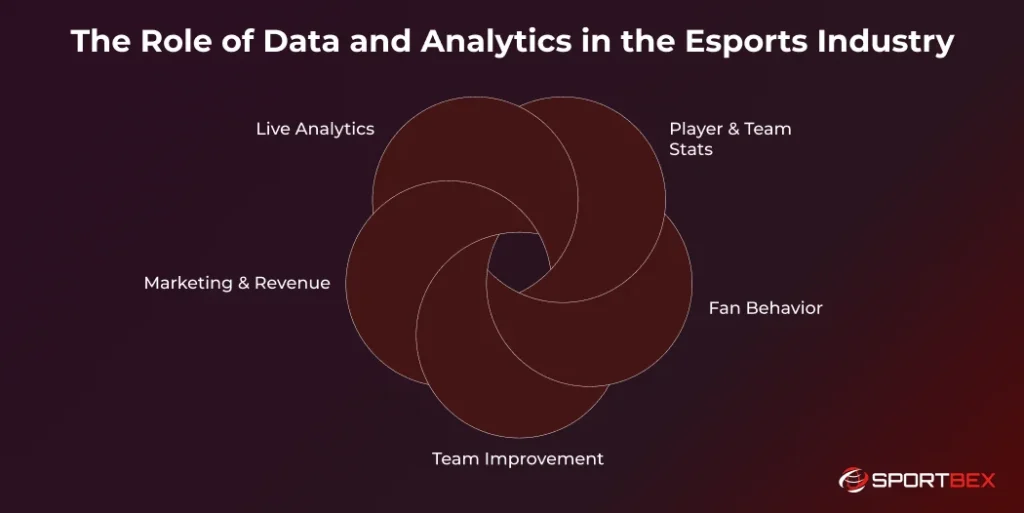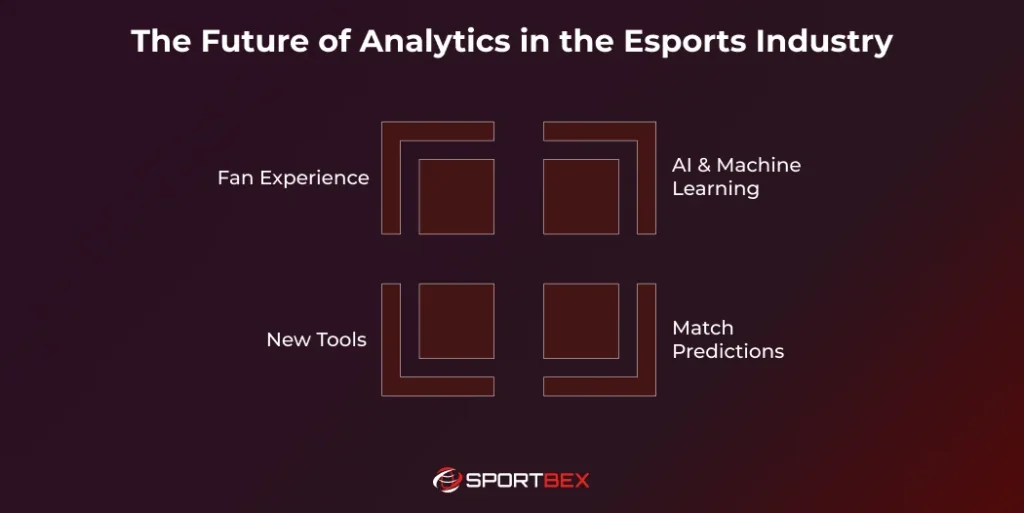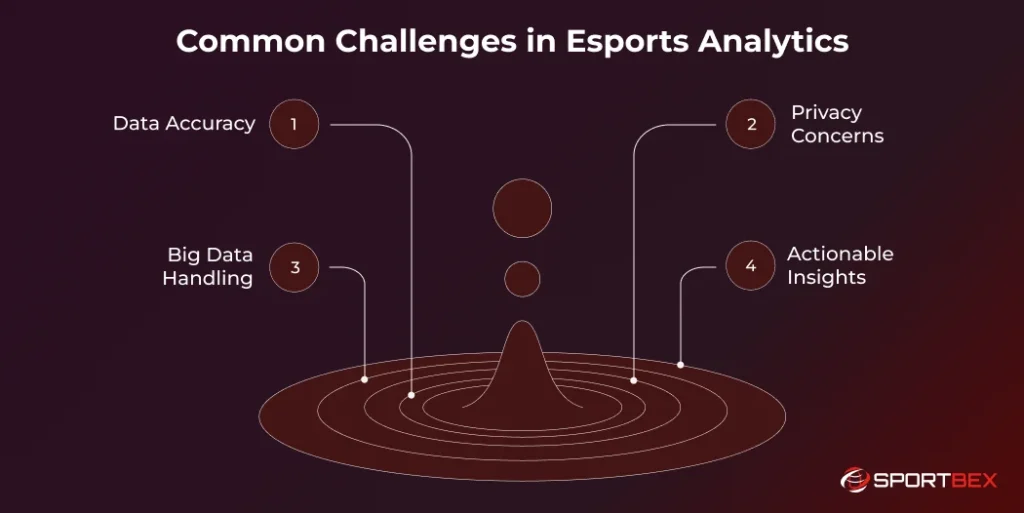The esports industry has grown a lot, changing from small gaming events into one of the biggest entertainment industries. What used to be friendly games between players are now big tournaments watched by millions of fans.
Today, esports has professional players, famous teams, huge sponsors, and massive prize pools. It’s no longer just about gaming; it has become a worldwide business that brings together competition, technology, and entertainment.
One of the main reasons for this rapid growth is the use of Esport analytics. Every game, move, and fan reaction creates valuable Esports Data. Teams use this data to understand player performance and improve their strategies.
Brands and sponsors study analytics to learn more about their audience and plan better marketing campaigns. Even fans benefit, as data helps make live matches more exciting with real-time stats, insights, and highlights.
In this blog, we’ll explore how esports analytics is changing the gaming world. You’ll see how data helps players perform better, how it supports smarter business decisions, and how it makes the viewing experience more enjoyable for fans. As the Esports Industry keeps growing, understanding how data Esport shapes its future is becoming more important than ever.
What is the Esports Industry?
The esports industry is all about competitive video gaming. It brings together players, teams, tournament organizers, sponsors, and streaming platforms to create games and events that fans can watch from anywhere in the world.
Unlike traditional sports, most esports competitions happen online and are streaming live, so millions of people can watch at the same time.
Esports covers many types of games, including:
- First-person shooters – games that focus on action and quick reflexes.
- Strategy games – games that require planning and teamwork.
- Sports simulations – digital versions of popular sports like football or basketball.
- Multiplayer Online Battle Arenas (MOBAs) – games where teams compete to control a map or objectives.
Popular games like League of Legends, Dota 2, and Counter-Strike are at the heart of these competitions. But esports is more than just playing games; it is also a business. Players and teams earn money through:
- Sponsorships from brands
- Advertising deals
- Media rights and broadcasting
- Merchandise sales
- Esports Betting Analytics
The Role of Data and Analytics in the Esports Industry

Data and analytics play a central role in shaping how esports operates. By understanding patterns, predicting outcomes, and optimizing strategies, the industry leverages information to gain a competitive edge.
Player & Team Stats
In the Esports Industry, every move a player makes is important. Kills, deaths, damage, and where a player spends most of their time on the map all give teams useful Esports Data. Coaches use this to plan better training, improve strategies, and help players grow. It also helps the team work together smoothly and perform better in matches.
Teams also pay attention to reaction times, decisions, and signs of fatigue. This helps them plan smarter during games, stay ready for tough opponents, and make sure players stay at their best. The combination of all this data makes both players and teams perform consistently better.
Fan Behavior
Fans are the heart of esports. By watching how people stream, follow teams, and interact on social media, organizers can understand what fans like. They can then make content that fans enjoy, recommend games, and create fun live events. This also helps teams understand Esports Market Trends and plan content that keeps fans coming back regularly.
Knowing what fans enjoy also helps teams and organizers plan events that keep viewers engaged. Happy fans watch more, stay loyal to teams, and help the Esports Industry grow bigger. This keeps the whole ecosystem alive and thriving.
Team Improvement
Data helps teams work together better. By reviewing past games and strategies, coaches can see what works and what doesn’t. Teams can practice different scenarios and be ready for anything that happens in a match. Consistent use of data allows teams to fine-tune their strategies and learn from every match.
This constant improvement helps teams spot weaknesses, adapt quickly, and stay strong in tournaments. Teams that use data well gradually perform better, giving them a real advantage over others in the competitive Esports Industry.
Marketing & Revenue
Data is very important for the business side of esports. Brands and sponsors use it to understand fans, run campaigns, and target the right audience. Teams can also use it to get sponsorships, sell merchandise, or offer memberships to fans. Using data in creative ways can also help identify new revenue opportunities for teams and platforms.
Even small things, like showing live data or interactive content, make fans feel involved. It increases engagement, improves fan experience, and helps teams earn more money while growing their brand.
Live Analytics
Live data makes matches more exciting by enabling Real-time analytics in esports. Coaches and teams can monitor what’s happening instantly, highlight key moments, and adjust strategies during the match, allowing quick reactions to changing in-game situations.
Fans also enjoy live stats, polls, and commentary. It makes them feel part of the match, keeps them interested, and makes watching esports more fun and exciting. It also allows fans to discuss moments with friends or online communities, making the experience more interactive.
The Future of Analytics in the Esports Industry

AI & Machine Learning
The future of esports is closely tied to AI and machine learning. These tools can help teams see patterns in games faster, plan smarter strategies, and even predict outcomes. Coaches can analyze large amounts of game data quickly, so they know exactly what players need to work on and how the team can improve.
AI also makes things fun for fans. Platforms can suggest matches, highlights, or content that each fan is likely to enjoy. This makes the whole gaming experience smoother and more exciting for everyone.
Match Predictions
Predicting match outcomes is becoming an exciting part of esports. By looking at past games, player performance, and team strategies, analysts can estimate who might win an upcoming match. It also adds value to Esports Betting Analytics, making platforms more engaging for bettors.
For fans and bettors, predictions make watching matches more thrilling. Platforms can show real-time probabilities and stats, making each game feel more interactive and keeping viewers interested until the very end.
Get Live Odds for Top Esports Titles
Use our reliable and fast API to create an engaging fan experience.
New Tools
New tools are constantly coming out to make esports data analytics easier. From interactive dashboards to real-time tracking apps, these tools help coaches, analysts, and even smaller teams access valuable information.
These technological advancements are transforming the Esports Industry, making it fairer and more competitive. Even teams with limited budgets can now use professional-grade analytics to improve strategies, optimize gameplay, and compete at higher levels.
Fan Experience
Analytics isn’t just for teams; it’s for fans too. Real-time stats, interactive dashboards, and personalized content make watching esports more exciting. Fans can track players closely, compare their performance, and feel like they are part of the action.
When fans feel involved, they watch more, support their favorite teams, and become active members of esports communities. This engagement keeps the Esports Industry vibrant, growing, and full of energy for both players and audiences worldwide.
Common Challenges in Esports Analytics

Data Accuracy
One big challenge in esports analytics is making sure the data is correct. Wrong or missing stats can lead to bad decisions for teams, organizers, or sponsors. Collecting reliable data from many sources is very important.
Teams also need to check and update their systems regularly. Trusting the data they use is essential; without it, strategies can fail and opportunities can be missed.
Privacy Concerns
Privacy is a serious concern in esports. Collecting data about players and fans comes with responsibility. Organizations need to protect this information and follow privacy rules carefully.
Fans and players are more aware of data privacy today. If their information isn’t handled properly, it can damage trust, lower engagement, and hurt the reputation of teams or platforms.
Big Data Handling
Esports generates massive amounts of data every second, making esports big data challenging to manage. Teams need powerful tools and skilled analysts to organize, store, and interpret this information correctly.
If data isn’t handled properly, important insights can be lost or misunderstood. Good systems ensure that large amounts of information are processed quickly and accurately, so teams can use it effectively.
Actionable Insights
Collecting data is only the first step. Teams need clear, practical insights they can use to improve performance, strategies, or fan engagement.
Analytics tools must present information in a simple way that’s easy to act on. Without actionable insights, even the best data becomes less useful, and teams can miss chances to improve or grow.
Conclusion
Esports analytics is changing the way we play and watch games. It helps players improve, teams plan smarter, and fans enjoy matches more. Every move and every stat gives useful information, and using it well can make a big difference.
The future of the Esports Industry is even more exciting. With new tools and live data, matches are becoming more fun and interactive. Fans can follow the action closely, and teams can keep getting better with every game.
There are some challenges too, like keeping data accurate and protecting privacy. But solving these problems will make esports stronger and more enjoyable for everyone.
At the end of the day, data is what makes esports run smoothly. Whether you’re playing, watching, or working in the industry, understanding and using it well, especially through an esports data API, is the key to better games, smarter decisions, and more fun for everyone.
Your All-in-One Esports Data Feed
Deliver real-time scores, stats, and in-game events for top esports titles.
Frequently Asked Questions
Data in the esports industry helps teams analyze player performance, track team strategies, understand fan behavior, and optimize marketing campaigns. It provides actionable insights for improving gameplay and business decisions.
Esports analytics tracks every player move, including kills, deaths, reaction times, and strategy choices. This data helps coaches and players identify strengths, weaknesses, and areas to improve, enhancing overall performance.
Esports collects data on player statistics, team performance, fan engagement, game outcomes, and even betting analytics. This comprehensive esports data helps organizations make informed decisions.
Teams and sponsors use esports data to understand fan preferences, track engagement trends, plan campaigns, attract sponsorships, and boost merchandise sales, contributing to the overall growth of the esports industry.
Esports betting analytics involves analyzing past matches, player performance, and team trends to predict outcomes. This data supports betting platforms and provides fans with more interactive experiences.
Recent Blog
Which Real-Time Sports Data API Offers the Fastest Live Updates?
January 23, 2026
 9 min
9 min
How Does a Live Odds Provider Deliver Real-Time Betting Data
January 23, 2026
 7 min
7 min







